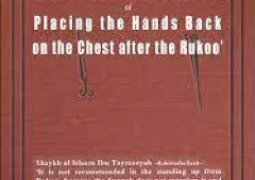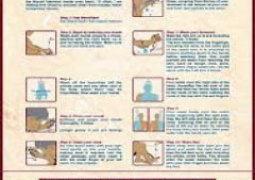
If a pregnant woman dies and the trustworthy physicians are sure that the fetus is alive, then it must be taken out of her womb by a caesarian operation.
A non-Muslim Woman who Dies while Carrying a Child by a Muslim is to be Buried in a Separate Grave
Al-Baihaqi reported from Wathilah bin al-Asqa’ that he buried a Christian woman bearing the child of a Muslim in a cemetery that belonged to neither Muslims nor Christians. Ahmad supports this opinion because he says that the woman being a disbeliever, cannot be buried in a cemetery of Muslims, for they would suffer because of her punishment, nor can she be buried in a Christian cemetery because her fetus, which is a Muslim, would suffer by their punishment.
The Preference of being Buried in Cemeteries
Ibn Qudamah said: “A burial in a cemetery is better for a servant of Allah than being buried in home, for this is less harmful to survivors in his family, is more like the dwellings of the hereafter, and is more suitable a place for making supplications for forgiveness and mercy for the dead. The Companions, their Successors, and those after them buried their dead in the deserts in cemeteries. Some people may ask: “Why then was the Prophet, peace be upon him, and his two Companions buried in his home?” In answer to this we would refer to the statement of ‘Aishah in which she said: “This was done lest the grave of the Prophet be turned into a mosque.’’ (Bukhari) The Prophet, peace be upon him, buried his Companions in the cemetery of “al-Baqi’ in Madinah and surely his action is more preferable than someone else’s action. The Companions of the Prophet regarded his burial arrangements as a special case for him because, as reported in a tradition “the Prophets are buried at the place they die,” and because burying him at his home distinguished his grave from those of others, and protected it from being exposed to great numbers of people, he was buried at home. When asked about a man who had instructed in his will that he be buried in his house, Ahmad said: “He should be buried with Muslims in their cemetery.”
The Prohibition Against Talking Ill of the Dead
It is not permissible to talk ill of the deceased Muslims or to mention their evil deeds. This is based on Bukhari’s report from ‘Aishah that the Prophet, peace be upon him, said: “Do not speak ill of the dead; they have seen the result of (the deeds) that they forwarded before them.” Abu Daw’ud and Tirmizhi have transmitted, but with a weak chain of narrators, from Ibn ‘ Umar a similar hadith that the Prophet, peace be upon him, said, “Mention the good deeds of your dead and cover their evil deeds.” As for those Muslims who openly do evil or indulge in illicit innovation, it is permissible to mention their evil deeds if some public good so requires and as a warning to others in order to discourage anyone who might otherwise follow their bad example. If no such benefit is to be gained, then it is not permissible to mention anything evil about the deceased. Bukhari and Muslim reported that Anas said: “A funeral procession passed by and the people praised the deceased. The Prophet, peace be upon him, exclaimed, ‘It is decided.’ Then another funeral procession passed by and the people said some bad things about the deceased. The Prophet, peace be upon him, remarked, ‘It is decided.’ ‘Umar asked: ‘What is decided?’ The Prophet, peace be upon him, answered, ‘The one whom you praised is entitled to Paradise, and the one whom you described as bad is entitled to the Hell Fire. You are Allah’s witnesses on earth’.” Cursing the dead disbelievers is permissible, because Allah, the Exalted, says: “Curses by the tongue of David and of Jesus, the son of Mary, were pronounced on those among the Children of Israel who rejected faith.’’ Qur’an 5.78 Similarly we read in the Qur’an: “Perish the hands of the Father of Flame!’’ Qur’an 111.1 Pharaoh and others like him have also been cursed in the Qur’an, besides the great curse of Allah about which we read: “Behold! the curse of Allah is on those who do wrong. Qur’an 11.18
Reciting the Qur’an by the Graveside
The jurists differ concerning the legality of reciting the Qur’an by the graveside. Ash-Shafi’i and Muhammad bin Al-Hasan consider it desirable, because by it, the deceased might be blessed. Al-Qadi ‘Iyad and scholars of the Maliki School agree with them on this point. Ahmad holds that there is nothing wrong in reciting the Qur’an at a grave, whereas Malik and Abu Hanifah view this as not desirable because the Sunnah does not mention this practice.
Building New Graves over Old Graves
Muslim scholars agree that a place where a Muslim is buried should not be disturbed if flesh, bones, or other parts of the body remain there. If any of his other remains are found it is not permissible to disturb them. But if the entire corpse has disintegrated into dust, then a new grave may be dug there. Also, in such a case it is permissible to use the land for planting, cultivation, building, and for other beneficial purposes. If the remains of a body, such as bones, are found during the digging, then the digging should be stopped. And if the remains are found after the digging is finished, then it is quite permissible to place these to one side in the grave and bury another body beside them.
If the deceased person was buried before a funeral prayer was offered for him or her and the person had not yet been covered with soil, then the remains should be removed and the funeral prayer should be offered before reburial. But if the deceased was buried completely without a funeral prayer, it is unlawful, according to the Hanafi and the Shafi’i schools, to dig up the grave. This is also the opinion of Ahmad, according to one narration from him. In such a case, a funeral prayer should be offered for the deceased without disturbing the grave. Yet another report from Ahmad says that in such a case the grave should be dug up, the body exhumed, and a funeral prayer offered for the deceased person. The leaders of the three schools hold it permissible to dig up a grave for a valid reason, e.g., to remove some money left in the grave, to turn the face of a body toward the Kaibah if buried otherwise, to wash a body that was buried without a proper purification, and to improve the shroud. This is not done, however, in cases when it is feared that by doing so the corpse will disintegrate.
The Hanafi School disagrees and considers it not permissible to dig up a grave for any of the above reasons. They consider such digging of a grave as a sort of dismembering of the body, which is not permissible in any case. Ibn Qudamah countered this position by explaining: “It would be considered dismemberment (Muthlah) only in the case of those whose bodies have rotten away. In such a case, a grave should not be dug up. If the deceased was buried without a shroud, then there are two alternatives. First, he should be left alone since the object of having a shroud is to cover the body. and that is achieved by covering it with soil. Second, the grave should be dug up and the body shrouded, because shrouding is obligatory and is as important as washing the body.” Ahmad said: “If the grave digger forgot and left his tools inside the grave, he may dig them up.” The same applies if someone dropped an axe, some money, or something of value. He was asked: “What if the deceased’s family offered the owner of the objects compensation for his lost valuables? “He said: “If they give him his rightful due, then he may not dig.”
Bukhari has reported a relevant hadith concerning this from Jabir, who said: “The Prophet, peace be upon him, came to Abdallah ibn Ubayy after he was lowered in his grave. He commanded his companions to take him out. Then he put him on his knees, blew his saliva over him, then put a shirt on him.” He has also reported: “A man was buried with my father. I did not feel good until I removed him and buried him in a separate grave.’’ (The body was taken out six months after his father’s death) Bukhari has given these two hadith in a separate chapter, entitled: “Can a deceased be taken out of the grave for any reason?” Abu Daw’ud reported from Abdallah ibn ‘ Amr who said, “While we were going to al-Taif and passing by a grave, I heard the Prophet, peace be upon him, saying: ‘This is Abu Raghal’s grave. ‘ He used to treat the Prophet insolently in the sacred precincts (of the Sacred Mosque). The Prophet, peace be upon him, added, ‘When he left, a retribution overtook Abu Raghal, as it did his people at this place, so he was buried here. And the proof of this is that he was buried with a piece of gold. So if you dig up his grave, you will get it.’ The People rushed to the grave, dug it up, found, and removed the gold piece.” Al-Khattabi said: “This shows that it is permissible to dig up the graves of polytheists if there is some good or benefit for Muslims in doing so. Indeed, in such a situation their case is not similar to that of deceased Muslims.”
To be continued
Read Other Articles In Muslims Hands
DEATH: Wailing over the Dead
Jul 10, 2020, 1:32 PM




